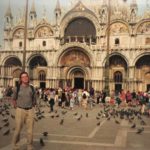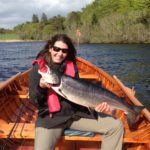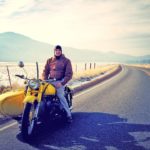Rachel Friedman is the author of The Good Girl’s Guide to Getting Lost: A Memoir of Three Continents, Two Friends, and One Unexpected Adventure (Bantam Books, 2011). She has written for The New York Times, New York and Bust magazines, Nerve.com, and The Chronicle of Higher Education, among others. She is a contributor to the The McSweeney’s Book of Politics and Musicals
(Vintage, 2012).
How did you get started traveling?
My brother was stationed in Germany when I was little and my family took a few trips over to see him during that time. We did a super quick, super touristy, 10 cities in 10 days kind of route, and all I really remember is sleeping a lot in the rental car. But then when I was fifteen I went to Israel with a temple youth group for six weeks. No parents. No rushing about. A hundred other crazy teenagers. I think that’s when I started associating travel with freedom. I returned home with wanderlust and a tattoo. I’m not sure which my parents were more upset about.
How did you get started writing?
I have early memories of writing in journals (always the locked kind, apparently I was a pretty paranoid eight year old) and recall how expressing my feelings that way felt good. Then later on in high school I wrote short stories and in college I started with personal essays, which might be what all that early journaling was leading up to. I’ve always been a reader (I’m the progeny of two English teachers so it’s in the blood), and when you read a lot I think it’s only natural at a certain point to want to give writing a try. You want to know if you’ve got any magic of your own.
What do you consider your first “break” as a writer?
I’ve done my career a little bit backwards. I published a book before having any freelance career to speak of, so getting my book accepted while I was in an MFA program was my first big break. Or maybe I should consider getting into that MFA program as the break.
As a traveler and fact/story gatherer, what is your biggest challenge on the road?
Feeling like I have enough time to really know a place. I tend to want to stay for days on end meeting people and wandering around and just generally losing myself to wherever I am. This is not an efficient strategy, as it turns out.
What is your biggest challenge in the research and writing process?
Scores of daily distractions. See: the Internet. Living in Manhattan.
What is your biggest challenge from a business standpoint?
Coming to terms with the financial realities of being a writer has been a struggle. How to make ends meet while having enough time to write is on my mind often. And I find myself wondering if I should do freelance work related to my skills as a writer or just do something totally unrelated in order to pay the bills. If anyone has ideas for undemanding but totally lucrative side jobs, I’m all ears.
Have you ever done other work to make ends meet?
I’ve been an editor, a university lecturer, an extra (that was short-lived, they pay extras terribly, it turns out), a waitress. Not in that order.
What travel authors or books might you recommend and/or have influenced you?
I love Susan Jane Gilman’s Undress Me in the Temple of Heaven. Sarah Turnbull’s Almost French
. Shutterbabe
by Deborah Copaken Kogan. Anything by Bill Bryson, J. Marten Troost, or David Sedaris.
What advice and/or warnings would you give to someone who is considering going into travel writing?
Travel. Write. That’s not very helpful, is it? How about this: realize that although you will be very rich in experiences you will not be actually rich. Or even close to it. I’m currently writing a magazine article about travel writers and have been informally collecting data on which ones are able to make a living solely from travel writing. I’ve only come across one so far and this person lives a existence of extreme frugality. The word monastic comes to mind.
What is the biggest reward of life as a travel writer?
Getting to experience the world. Being a travel writer (being a nonfiction writer in general, actually) is pretty great for someone like me — who is both shy and curious. Writing about a place gives me an excuse to investigate it exhaustively: to ask people endless questions about their city or their meal or their job or their clothing. So I guess the biggest reward is actually the people you meet while getting to experience the world.





